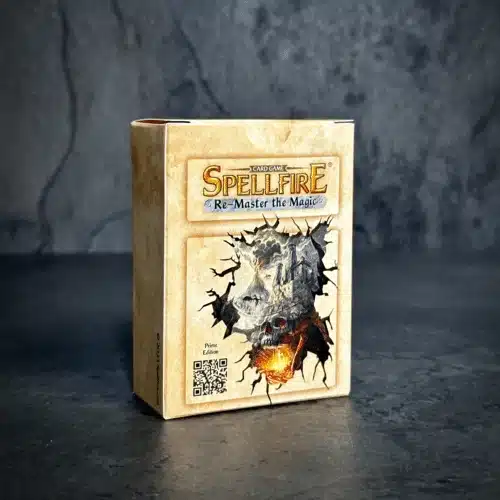The Strategy
Secrets, tips, and tricks to win the gameOptional Rules
Add a different twist, strategy, and fun to the game
Spellfire game could be made even more interesting by adding some optional rules. In games with optional rules, players can omit them at their discretion, but everyone must agree on which rules will be used before the game.
Usually, players decide on the rules before deck selection. To keep track of additional levels or cards under the control of another player, several of these rules use counters or chips. We recommend that you try the rules marked with an asterisk (*).
(*) Multiple attack mode
This optional rule differs primarily because a realm is not automatically razed when the attacker wins a round of combat. It means several combat rounds. The attacker must choose another champion, entering the battle a second time. The attacker must then select the third champion if the defender loses again.
When a defender wins a round, takes the spoils, and the attacker cannot attack again. Unless otherwise specified on the card, neither attacker nor defender can use the same champion twice. Realms are razed when the defender decides not to defend or lacks champions to defend the realm.
(*) Aiding the Attacker or Defender
This variant adds excitement to games with four or more players as all players can participate in the battle. Both the attacker and the defender can request aid from other players, but players outside the battle can never force their aid on an unwilling attacker or defender. You can aid only one side or the other, never both.
Contributed allies and spells are discarded at the end of the combat; magical items and artifacts are discarded only if the champion they are attached to is defeated.
If the battle winner is entitled to the spoils of victory, his allies are likewise entitled to a free card. If this allows two players to place down their sixth realm, they share the victory.
(*) The Barbarian's Game
With this variant, a game ends when the player at the beginning of a turn (phase 0) has six unrazed realms in his formation. THe Caravan card is not counted.
Six is the maximum realm that can be placed in a formation. A player's discard pile becomes the new draw pile when the player runs out of cards in his draw pile.
Conqueror's Game
Those who want a more aggressive version of this game can win by having six realms in their formation and razing three other realms. This optional rule is recommended only for multi-player contests since it is very challenging to achieve in a one-on-one game and overall is more fitted for experienced players.
While playing this, it does not matter whether your formation's six realms are razed or not. It's still possible to win even after all of them are razed. Whenever a realm is razed, mark that realm with a marker so that everyone knows who did it. These markers should all be unique, and a coin, dice, or poker chip are excellent markers. The marker will be returned to the player if the realm is rebuilt or discarded.
Destroyed Worlds
In this optional rule, the realms are not razed but destroyed. Sending a realm to the discard pile or the Abyss will permanently remove it from the game, and they cannot be brought back.
This rule doesn't affect cards that are discarded before ever being in play.
(x) World Bonuses
Champions' levels increase by 3 when they attack or defend a realm of their world.
True Victory
In this option, you must have at least six realms in one formation to win. By this rule, nobody can win the game by drawing a final card from his draw pile. Once you have drawn all your cards, you must shuffle the discard pile to form a new draw pile. Abyss cards never get reshuffled.
Treasure Spoils
As an optional rule, this expands upon the spoils of victory. When a champion defeats an opponent in battle, any attached magical items and artifacts held by the defeated champion are transferred to the victor. Limbo or the Abyss champions do not fall under this rule. Also, the importance of this is that artifacts and magical items can be legally attached to the victor.
Players should use counters or chips to track which cards belong to whom.
Parallel Universes
When the number of players is particularly large (6 or more), the Rule of the Cosmos can limit gameplay. With the Parallel Universes optional rule, two champions, artifacts, realms, or holdings can exist simultaneously.
Questing
A champion in your pool can be turned face down during phase 2 of your turn, and an eligible champion must be capable of attacking or defending that turn and not be hampered by an event or spell. This champion has gone questing and cannot be used to attack or defend until your next turn.
Take a look at the top card from an opponent's draw deck during phase 2 of your next turn:
if it is not a champion, card discards.
if it is a champion, you must face it in one-on-one combat where no one can add any cards. Judge the victor strictly by the levels and the powers on the two cards, considering the questing champion the attacker, his opponent the defender (who wins ties).
Each player can send one champion to quest each turn. Questing can force an opponent's card to be discarded without using it and possibly remove an opposing champion from play.


